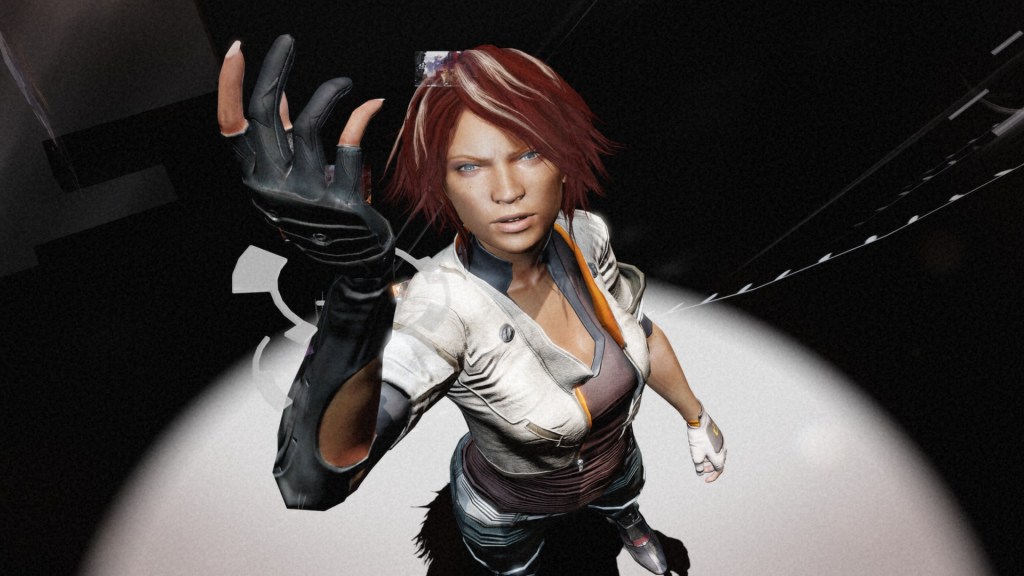We can remember it for you.
Amnesiacs don't usually get the opportunity to load a back up brain and pick up where they left off, and as it turns out, even a holographic computer hard-disk brain like the ones citizens of Neo-Paris have don't work like that. Remember Me's amnesiac protagonist Nilin wakes up in a holding cell and follows the voice of Edge into the light, all while wondering who she is and what has happened to her memories.
DONTNOD puts players in Nilin's combat skin in the hopes that they'll help her ignite the inherited Parisian desire to overthrow, rebel, and generally turn their city into a heap. A vivid view of futurism lays in front of Nilin and the player, even allowing gameplay mechanics to reflect the narrative focus and purpose. Despite that fearlessness and Remember Me's dogged and brave stand against cliche'd hyper-marketed gaming tropes, DONTNOD still falls a little short.
In the game's first minutes, Nilin is escaping from what appears to be an asylum, but it doesn't take long for Edge, the mysterious voice in her head to coach her back into fighting shape. Pretty soon, Nilin's got an entire frontal-lobe's worth of special abilities. She can beat the crap out of people, overload their brains with a blast of trash data, or even remix and alter the memories of certain characters.
Remember Me's strength comes from the risks it takes. The world is vibrant, but not completely without restraint. It rivals Rapture (whichever…) in some sequences, but others like Slum 404 drag on and on in complete disservice to Remember Me's ambition. It feels like padding when you head back to the Leaking Brain (an "Errorist" hang-out) or to another of the many oppressive corporate environments. Still, jaunting over, under, and through a futuristic Paris, as run down and gothic as Blade Runner's Los Angeles, is fun. Plus, platforming is broken up by copious amounts of hand-to-hand combat.
Grunt-level "Leapers" and elite corporate soldiers in Minority Report-style garb can all be dispatched with GLaDOS and Sugar Ray (which is what I call Nilin's fists). Battle after battle, new elements will be added to keep combat fresh; plus every win will earn you Pressens. In the Combo Lab, you'll string different Pressens together in a handful of different combos. The further a Pressen is in the order, the greater effect it'll have. Place a recover Pressen at the end of an 8 hit combo and you'll earn further XP and a huge health bonus.

S-Pressens give you special abilities and crowd-clearing effects. One allows you to turn invisible and select an enemy to Overload at will. Another is a bomb that lets you dodge out of its area of effect. I love the way these Combo Lab mechanics play off the game's narrative. Nilin recovers her most elite moves as she remembers more of the world around her, but combat still forgets a few things.
The first 4-5 hours of the game are a slog of battle after battle. Enemies quickly develop sponge armor, forcing you to hammer away with your most powerful combo. Further, equipping a specific combo can break many scenarios as spamming becomes the best tactic. I wish I could just forget the grind like the upper-class Paris-ites who destroy memories and replace them with new falsified recollections to numb the pain.
Other combat-heavy games have layered gadgets, beat-downs, and grapples with special moves and more importantly, counters (up to three baddies at a time). Another recent action-game also relied on sponge-y enemies, but it featured a greater variety of moves and acrobatics. This game has that combat spark, a neat customization hook, and you can't deny there's a satisfyingly frantic feeling you get from attempting a huge combo when enemies can interrupt or outright jump in front of your target. It gets old after a while, but luckily memory remixing happens more frequently in the second half of the campaign.
Certain narrative beats allow players to access an individual's memory and alter seemingly insignificant details to change their present-day outlook. You may have seen the gameplay clip above when the title was first revealed, and I wish scenarios like this happened a lot more often. The narrative can turn sharply in these moments, and it was fun seeing how each altered moment played out. At one point in a monologue Nilin wonders about playing God, and that's exactly what it felt like.
Sadly, it just didn't happen enough. There's a lot to like in Nilin, in Neo-Paris, and in the futurism-effects. Watching blasts of holographic data pummel an enemy, finding the correct sequence to alter everything about a core figure, and leaping from building to building can be incredibly satisfying. What should feel like discovering Shakespeare as you write it eventually turns into lines on a chalkboard in detention.
I suspect many will doggedly reprimand or passively tolerate Remember Me, but at least it tries something new. Nilin is a cross between Faith Connors and Vanessa Z. Schneider, but maybe not as fully developed as Lara Croft's turn earlier this year. I had a really good ending to this review, but… I forgot.
Copy provided by publisher. Available for Xbox 360, PS3, and PC.
-
Mix of gameplay elements
-
Neo-Paris and a strong female lead
-
Change their memory and their mind
-
Repetitive
-
Encourages spamming
-
Crafting the perfect combo
-
Neat combat effects and acrobatic moves
-
Not enough memory remixes







